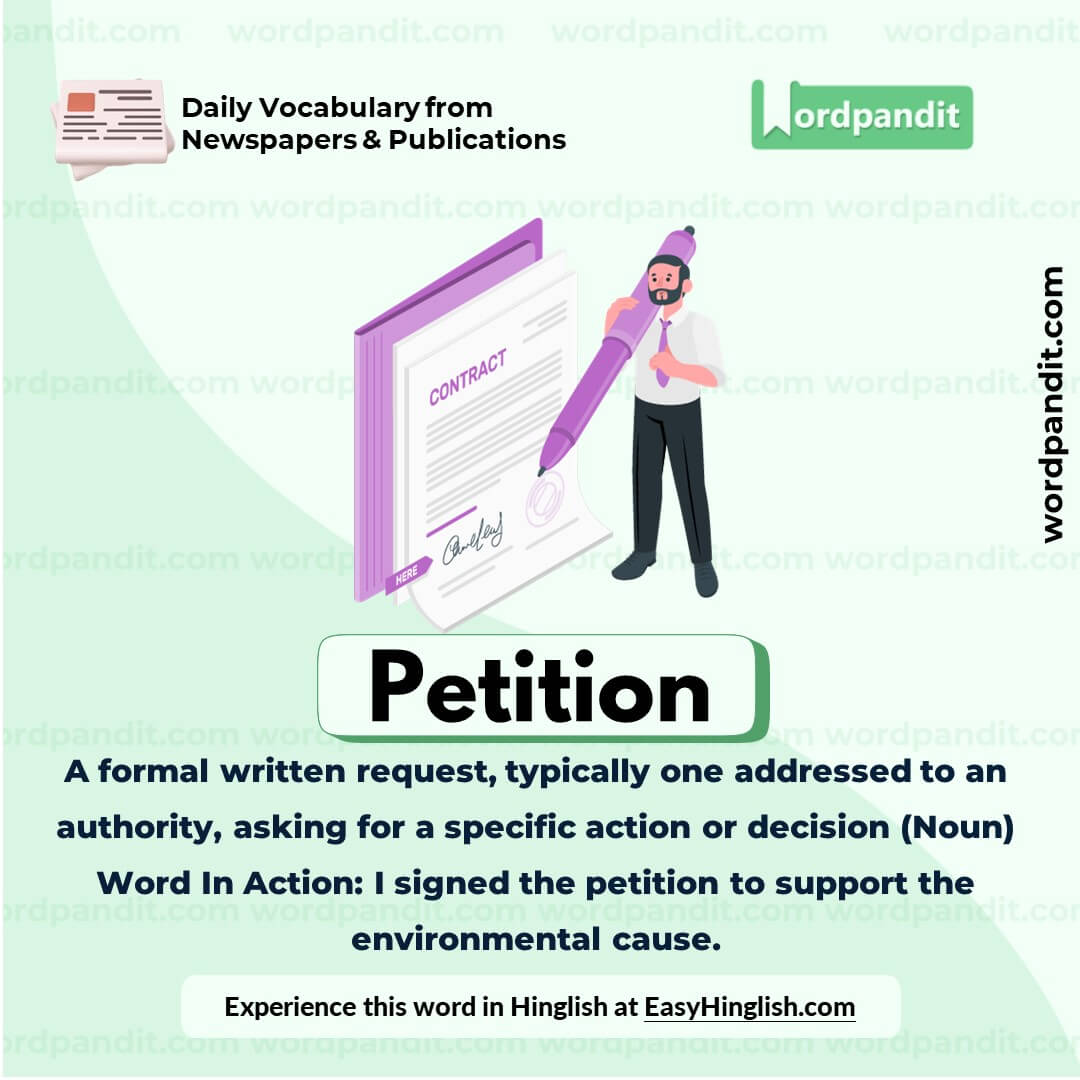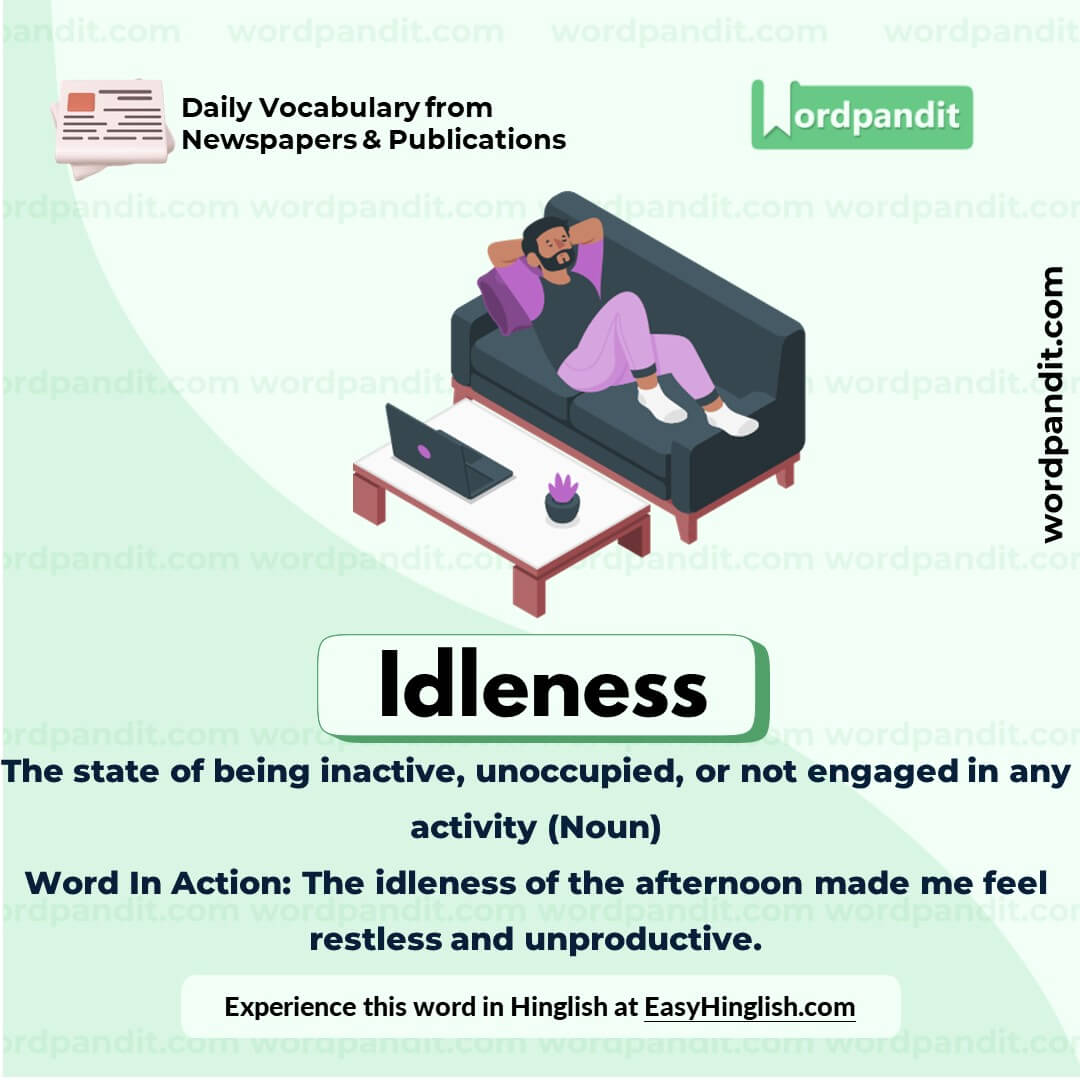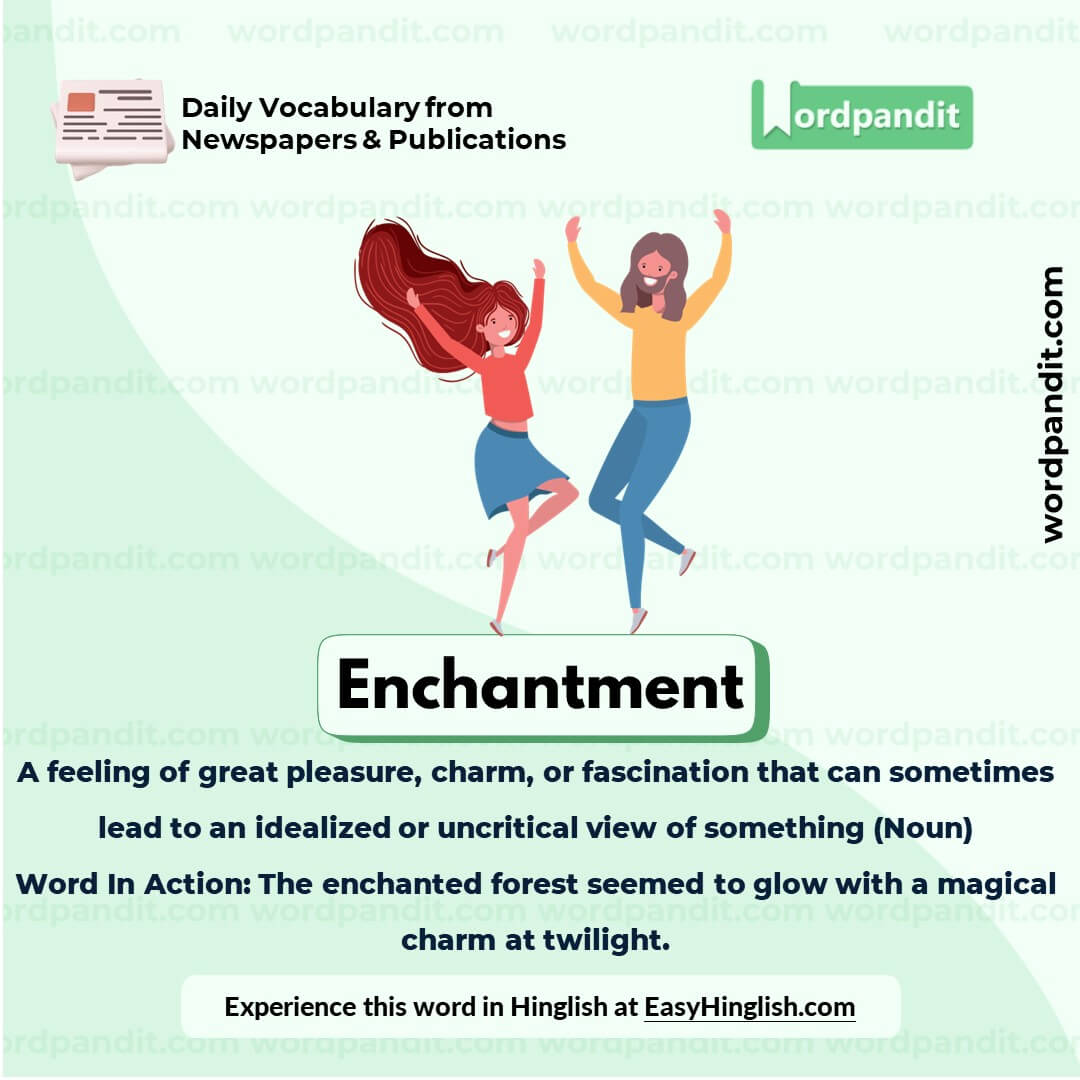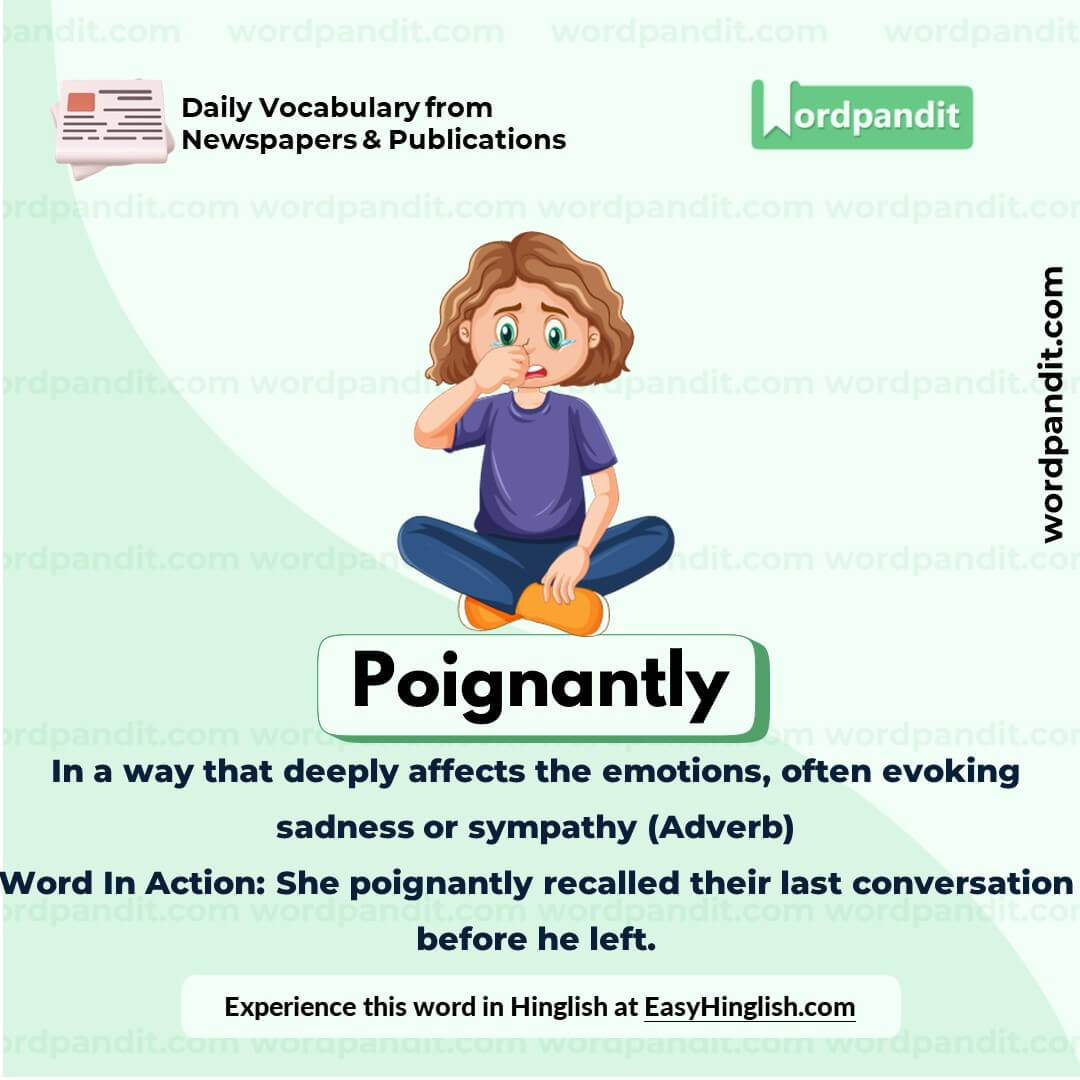Daily Vocabulary from Indian Newspapers and Publications
Welcome to Wordpandit’s Indian Vocabulary Hub
At Wordpandit, we understand the importance of staying rooted in the local context while expanding your language skills. This section focuses on enriching your vocabulary with words and phrases drawn from India’s leading newspapers and publications, ensuring you're learning vocabulary that is practical, relevant, and uniquely Indian.
Why Indian Sources Matter
We believe that the best way to master any language is by immersing yourself in local content. That’s why we carefully curate vocabulary from top Indian publications, including:
- The Hindu
- The Times of India
- The Economic Times
- Hindustan Times
- Live Mint
- The Indian Express
- And many others...
Stay Updated, Stay Relevant
With daily updates from Indian news sources, you’ll be consistently learning words that reflect the trends and shifts in Indian society and culture. Our focus is to provide vocabulary that enhances your understanding of the language in an Indian context.
How Wordpandit Supports Your Goals
Whether you’re preparing for exams, aiming to improve your professional communication, or simply want to stay connected with the latest Indian vocabulary, Wordpandit is here to guide you every step of the way.
Learn with a Practical Approach
Our interactive learning methodology includes real-world examples, engaging activities, and context-specific usage to ensure that every word becomes part of your active vocabulary.
Dive into Indian Vocabulary Today!
Why Choose Wordpandit?
Practical Learning: Focus on words you'll actually encounter in real-world reading, enhancing your comprehension and communication skills.
Diverse Content: From current affairs to scientific breakthroughs, our varied sources expose you to vocabulary across multiple domains.
Effortless Integration: Make Wordpandit a part of your daily routine. Just a few minutes each day can significantly boost your lexicon over time.
Your Path to Vocabulary Mastery
- Visit our Daily Vocabulary section regularly
- Explore new words and their usage in context
- Practice incorporating these words into your own writing and speech
- Track your progress as your vocabulary expands
Start Your Journey Today
Embark on your vocabulary enhancement journey with Wordpandit. By consistently engaging with our daily posts, you'll build a robust vocabulary that serves you well in academic, professional, and personal contexts.
Remember, a word a day keeps linguistic limitations at bay. Make Wordpandit your daily companion in the quest for vocabulary excellence!
WORD-1: Petition
Context:
"The Supreme Court recently dismissed a petition filed by one G Venkiteswarlu who alleged that his brain was being controlled by other persons through a machine" - The New Indian Express
Explanatory Paragraph:
The word "petition" refers to a formal written request, typically one signed by many people, appealing to an authority, such as a court or government body, for a specific action or decision. In legal contexts, a petition often initiates a case or is submitted to request some form of intervention or change.
Meaning: A formal written request, typically one addressed to an authority, asking for a specific action or decision. (Noun)
Pronunciation: pɪˈtɪʃən
Difficulty Level: ⭐⭐⭐ Intermediate
Etymology: The word "petition" comes from the Latin word "petitio," meaning "a request" or "an application," which itself comes from "petere," meaning "to seek or to request."
Synonyms & Antonyms:
Synonyms: request, appeal, plea, application, demand
Antonyms: denial, rejection, refusal, dismissal
Usage Examples:
- The citizens launched a petition asking the local government to build more parks in the area.
- The petition for clemency was rejected by the president after careful review of the case.
- After the petition failed to gain enough support, the organizers decided to address the issue directly with the mayor.
- He filed a petition with the court seeking the annulment of the earlier ruling on his case.
Cultural Reference:
"A petition is the first step toward the change you seek." - Author Unknown
Think About It:
Why do you think petitions are an important tool for social or political change? How does the act of formally requesting action shape the outcome of a cause?
Quick Activity:
Write a brief petition about an issue that matters to you, outlining what action you want authorities to take. Include your reasons clearly and persuasively.
Memory Tip:
Think of the word "petition" as a formal "petition" for something you want, like requesting a special favor. Remember that it's often a collective effort involving multiple people or a legal request.
Real-World Application:
Petitions are used in many real-world situations, such as requesting changes to laws, seeking justice, or making appeals for public support. Online petitions have become a widespread method for people to voice their concerns and gather support on various causes.
WORD-2: Idleness
Context:
"The advent of industrialisation undermined the power of hands for the first time; since then, machines have forced hands into a state of forced idleness." - Telegraph India
Explanatory Paragraph:
Idleness refers to a state of inactivity or lack of work. It often carries a negative connotation, implying waste of time or potential. In the context of human labor, idleness can be seen as the result of machines or other factors reducing the need for manual effort, leading to periods of inactivity or unemployment.
Meaning: The state of being inactive, unoccupied, or not engaged in any activity. (Noun)
Pronunciation: ˈaɪ.dl.nəs
Difficulty Level: ⭐⭐ Intermediate
Etymology: The word "idleness" comes from the Old English word "idels," meaning "empty" or "unoccupied." It shares roots with words meaning "vain" or "futile."
Synonyms & Antonyms:
Synonyms: inactivity, laziness, stagnation, rest, inaction
Antonyms: activity, productivity, work, effort, engagement
Usage Examples:
- The workers sat in idleness, waiting for new tasks to be assigned to them.
- After the automation of the factory, many employees found themselves in a state of forced idleness.
- The long hours of idleness during the weekend gave him plenty of time to think and reflect.
- She felt a sense of guilt after hours of idleness, knowing she should have been working on her project.
Cultural Reference:
"Idleness is not doing nothing. Idleness is being free to do anything." - Fernando Pessoa
Think About It:
Is idleness always negative? In what situations could idleness be seen as necessary or even beneficial?
Quick Activity:
Think about a time when you experienced idleness. Was it forced, or did you choose to be idle? Write a short reflection on the experience and its impact on you.
Memory Tip:
Remember the phrase "idle hands are the devil's workshop," which suggests that when people have nothing to do, they may get into trouble. This can help you recall the negative connotations of idleness.
Real-World Application:
In the modern workforce, automation and technology have led to an increase in idleness for some workers. Understanding the balance between work and rest is essential in ensuring that idleness doesn't result in unproductive or unhealthy consequences.
WORD-3: Enchantment
Context:
"In this modern, mechanised era, humans need to reject their collective enchantment with machines and technology — speech-to-text apps, robot cleaners, audiobooks and what not — that are stripping hands of their potential." - Telegraph India
Explanatory Paragraph:
Enchantment refers to a state of being charmed, captivated, or delighted, often in a way that makes one overlook practical concerns or consequences. In the context of technology, enchantment implies an overwhelming fascination with technological advancements that might cloud our judgment or distract from the simpler, more meaningful aspects of life.
Meaning: A feeling of great pleasure, charm, or fascination that can sometimes lead to an idealized or uncritical view of something. (Noun)
Pronunciation: ɪnˈtʃæntmənt
Difficulty Level: ⭐⭐⭐ Intermediate
Etymology: "Enchantment" comes from the Old French word "enchanter," meaning "to bewitch or charm," which in turn comes from the Latin "incantare," meaning "to sing a spell upon" or "to enchant."
Synonyms & Antonyms:
Synonyms: charm, fascination, allure, magic, spell
Antonyms: indifference, repulsion, disinterest, boredom
Usage Examples:
- The children were spellbound by the enchantment of the fairytale.
- Her enchantment with the idea of traveling the world made her pursue a career in travel journalism.
- Despite the enchantment of new technology, the elderly still preferred the simplicity of traditional methods.
- The enchantment of the forest, with its serene beauty, left the hikers in awe.
Cultural Reference:
"The enchantment of technology lies not just in its capability but in its ability to captivate the imagination of its users." - Author Unknown
Think About It:
How can the enchantment with modern technology both enrich and limit our lives? Is it possible to enjoy technology without becoming overly enchanted by it?
Quick Activity:
Write a short paragraph on something you feel enchanted by — whether it's a technological gadget, a hobby, or a place. Then, reflect on how this enchantment affects your behavior or decisions.
Memory Tip:
Associate "enchantment" with a magical experience or fairy tale. Imagine being under a spell — "enchantment" is the charm or magic that makes you feel captivated and intrigued.
Real-World Application:
Enchantment can be both a powerful force and a potential distraction in real life. In the case of technology, it’s essential to balance fascination with practical use, ensuring that enchantment doesn’t overshadow real-world needs or potential consequences.
WORD-4: Poignantly
Context:
"John Keats, wrote a poem describing the warm and grasping powers of the 'living hand' that would soon turn 'cold', poignantly expressing the poet’s fear of not being able to write poetry with his hands that had become weak with illness." - Telegraph India
Explanatory Paragraph:
Poignantly is used to describe something that evokes deep emotion, especially sadness or sympathy. It often refers to moments that are emotionally moving, stirring, or heart-wrenching. In the context of John Keats’ poem, the term poignantly emphasizes the intense feeling of fear and loss that the poet experienced as his physical strength and ability to write were fading away.
Meaning: In a way that deeply affects the emotions, often evoking sadness or sympathy. (Adverb)
Pronunciation: ˈpɔɪn.jənt.li
Difficulty Level: ⭐⭐⭐ Advanced
Etymology: "Poignantly" derives from the adjective "poignant," which comes from the Old French word "poignant," meaning "piercing" or "sharp," referring to an emotional sensation that cuts deeply.
Synonyms & Antonyms:
Synonyms: movingly, touchingly, emotionally, sadly, tragically
Antonyms: joyfully, happily, cheerfully, amusingly
Usage Examples:
- The soldier’s farewell letter was poignantly written, reflecting his fear of never returning home.
- Her words, spoken poignantly at the memorial service, brought tears to everyone in the room.
- He remembered poignantly the last time he saw his childhood friend, who had moved away years ago.
- As the film ended, the poignantly played music deepened the sense of loss and reflection.
Cultural Reference:
"It is not the length of life, but the depth of life that matters." - Ralph Waldo Emerson (Poignantly captures the idea that life’s emotional moments, especially those marked by loss, are what truly define it.)
Think About It:
What are some moments in your life that you remember poignantly? How can those moments help you understand emotions like loss and nostalgia more deeply?
Quick Activity:
Write a short letter or diary entry describing a poignant moment in your life. Focus on the emotions that made the experience unforgettable and impactful.
Memory Tip:
Think of "poignant" as something "sharp" or "piercing" to the heart. The emotional impact it creates can feel like an intense, sharp sensation in the chest.
Real-World Application:
In literature and storytelling, using the adverb "poignantly" allows authors to create more emotional depth. In real life, poignant moments often define significant relationships, making them valuable for personal growth and understanding emotions.
WORD-5: Dexterity
Context:
"Mark Knopfler, also draws to the dexterity of human hands." - Telegraph India
Explanatory Paragraph:
Dexterity refers to the skill and ability to use the hands or body with precision and ease. It is often associated with tasks that require delicate or intricate movements, such as playing an instrument, crafting, or performing complex tasks. In the context of Mark Knopfler, the term emphasizes the importance of manual skill, particularly in relation to playing guitar, a task requiring both fine motor control and coordination.
Meaning: Skill and grace in performing tasks, especially those involving the hands or body. (Noun)
Pronunciation: dɛkˈstɛrɪti
Difficulty Level: ⭐⭐⭐ Intermediate
Etymology: "Dexterity" comes from the Latin word "dexter," meaning "right-handed" or "skilled," which later evolved to mean skillfulness, especially with the hands.
Synonyms & Antonyms:
Synonyms: skill, proficiency, adroitness, agility, finesse
Antonyms: clumsiness, ineptitude, awkwardness, incapacity
Usage Examples:
- The surgeon's dexterity was evident as he performed the delicate operation with ease.
- Her dexterity on the piano was unmatched, as she played complex pieces with fluid grace.
- Mark Knopfler’s dexterity on the guitar is a testament to years of practice and skill.
- The carpenter’s dexterity was clear as he crafted intricate furniture pieces with precision.
Cultural Reference:
"Dexterity in music is like the soul’s language — when you play with skill, the melody speaks louder than words." - Author Unknown
Think About It:
How do you think dexterity can impact other areas of life beyond physical tasks? Can mental dexterity, such as quick thinking or problem-solving, be as important as physical skill?
Quick Activity:
Try a task that requires precision and dexterity, like drawing, playing an instrument, or solving a complex puzzle. Focus on the skill and coordination required to complete the task effectively.
Memory Tip:
To remember "dexterity," think of "dexter," which means "right-handed." Since most people are right-handed, the word symbolizes skill and ease with one's dominant hand.
Real-World Application:
Dexterity is essential in many real-world contexts, from surgery to sports to art. It reflects a person’s ability to execute tasks that require fine motor control and agility, making it a critical skill in professions and hobbies alike.
















